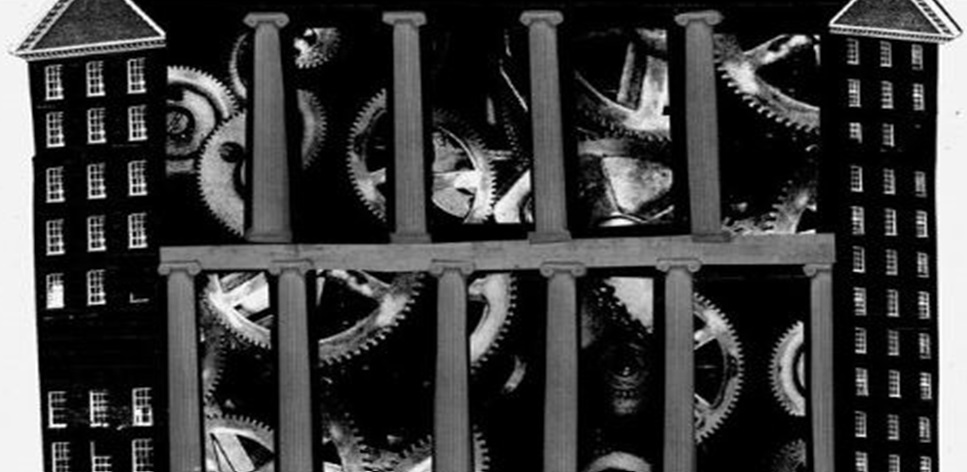By David French | The New York Times | March 14, 2024

This Monday, March 11, roughly 200 Jewish students and supporters marched through the campus of the University of California, Berkeley, and it was newsworthy that they were not attacked. Local news hailed that they were able to, as one headline noted, “ successfully march without confrontation .”
The march came two weeks after violent protests forced the cancellation of an event that was to feature an Israeli speaker and was organized by Jewish students. The event — which had already been moved from another location because of safety concerns — was canceled, and the building evacuated by police, after protesters broke through doors and reportedly assaulted Jewish students . There was no way to ensure safety, university administrators explained, “given the size of the crowd and the threat of violence.”
At the time that I read accounts of the violence at Berkeley, I was also reading two legal complaints about antisemitism on elite college campuses, one filed against Harvard and the other against the Massachusetts Institute of Technology . Both complaints make for horrifying reading, detailing a cascading series of antisemitic incidents, including acts of violence and physical intimidation. The moral and legal injury is compounded by blatant double standards on the part of the universities. As the complaint filed against Harvard states, “Harvard permits students and faculty to advocate, without consequence, the murder of Jews and the destruction of Israel, the only Jewish country in the world. Meanwhile, Harvard requires students to take a training class that warns that they will be disciplined if they engage in sizeism, fatphobia, racism, transphobia, or other disfavored behavior.”
I spent virtually my entire legal career defending free speech on campus, including the free speech of Muslim students and staff members . I’ve also walked through metal detectors at a tense and volatile Columbia University to defend the academic freedom of Jewish students challenging antisemitic statements made by university professors. And during those decades of litigation and my subsequent years in journalism, I have never seen such comprehensive abuse directed against a vulnerable campus minority group as I’ve seen directed at Jewish students and faculty since Hamas’s terror attack on Oct. 7.
Obviously antisemitism isn’t the only hatred afoot in America. Since Oct. 7, there have also been horrifying incidents of anti-Muslim violence. Shortly after the Hamas attack on Israel, the chancellor of the state university system of Florida ordered the deactivation of chapters of Students for Justice in Palestine based on the absurd idea that its written materials provided “material support” for a designated terrorist entity in violation of federal law. ( The order has not been enforced .) But what’s happening to Jewish students and faculty at several elite campuses is so comprehensive and all-consuming that it can only be described as systemic antisemitism.
Which brings me to the complaints against M.I.T. and Harvard. One should always use caution when evaluating such documents. They represent the allegations of one side. There are times when litigation ultimately proves the accuracy of a complaint’s claims and times when the allegations fall apart under scrutiny. (There are also times when the case grows stronger as the plaintiffs obtain discovery, read internal communications and depose witnesses under oath.) The complaints against M.I.T. and Harvard, however, don’t simply ask us to trust them. Time and again they provide screenshots, quotes from emails and photographs that offer visual evidence of their claims.
And make no mistake, the claims are dreadful. At M.I.T., for example, the plaintiffs claim not only that the university allowed pro-Palestinian protesters to hold protests that violated university rules, but also that those protests were so threatening that Jewish students were afraid to get near them. M.I.T. Hillel warned students to “not directly engage protesters for your physical safety and well-being” and ideally to avoid the area. This resulted in parts of campus being effectively closed to Jewish students.
The complaint also charges protesters with literally putting a bounty on a Jewish student who had engaged in a physical altercation at a protest, promising an $800 award for identifying the student. According to the complaint, “The student stayed locked up in their dorms for weeks with their friends bringing food, check-ins from the police, and their family terrified for their safety.”
The plaintiffs also claimed that protesters engaged in “targeted protests outside the offices of Jewish professors and the office of M.I.T.’s Israel internship program,” a part of the university’s global experiences program known as MISTI. The complaint quotes a professor who said, “They insistently rattled the door handles of offices that were closed with staff inside …. Their chants included: ‘From the river to the sea…’, ‘MISTI, MISTI, you can’t hide,’ and others associating MISTI with genocide.”
Blood libel also makes its dreadful appearance. The complaint quotes an M.I.T. postdoctoral student (as the complaint notes, postdocs are both students and employees of the university) posting on X, “Zionists not only steal our lands, food, and culture, but our dead bodies as well for organ harvesting.”
These incidents represent only a fraction of the claims against M.I.T. The complaint against Harvard likewise details protests that shut down parts of campus, physical assaults against Jewish students and disruptions of classroom instruction so frightening that one caused “Jewish students to flee for their safety, with some removing identifying garb to avoid attack.”
Pervasive fear is a theme of the Harvard complaint. It details an incident at Harvard Law School where campus police allegedly observed passively as a mob of protesters “stormed Harvard Law’s main building, marched down the length of the building’s primary first-floor hallway, and blocked the hallway outside the study room where [Students Against Anti-Semitism and a visiting speaker] were hiding. Fearing a violent attack, students in the study room removed indicia of their Jewishness, such as kippot, or hid under desks.”
Pause and think about that for a moment. In the year 2024, at one of the most prestigious and powerful academic institutions in the world, the plaintiffs claim that Jewish students felt the need to hide under their desks for their physical safety.
Just after I finished reading the complaints against Harvard and M.I.T., I read Franklin Foer’s gut-punch cover story in The Atlantic . Titled “The Golden Age of American Jews Is Ending,” it begins like this: “Stacey Zolt Hara was in her office in downtown San Francisco when a text from her 16-year-old daughter arrived: ‘I’m scared,’ she wrote.” In the days following Oct. 7, her classmates were staging a walkout to protest Israel, and the atmosphere was tense. “Parents were texting one another ideas about where in the school their children could hide,” Foer wrote. “Zolt Hara placed a call to the dean of students. By her own admission, she was hysterical. She says the dean hung up on her.”
I urge you to read Foer’s entire story, just as I urge you to read both of the legal complaints I’ve described. If you do, you’ll see that there is a certain dreadful sameness to all these stories: Universities and schools demonstrate far greater tolerance for antisemitic speech and behavior than for virtually any other kind of offensive speech or behavior. They bend or break the rules to accommodate pro-Palestinian protests. Jewish students then face intimidation and even assaults.
To defeat systemic antisemitism, universities don’t have to stifle free speech. They simply need to uphold their legal obligations to Jewish students. Title VI of the Civil Rights Act of 1964 requires universities that receive public funding to protect Jewish students from antisemitic harassment and discrimination , and a leading indicator of discrimination is blatantly disparate treatment. If you permit protesters who target Jewish students to break university rules, you’re asking for a lawsuit. If you’ve permitted the campus environment to deteriorate to such a degree that Jewish students reportedly hide under their desks for safety, then you should face catastrophic monetary penalties.
Moreover, no one should excuse the targeting of Jewish students in America as mere “anti-Zionism.” When American Muslims are targeted or persecuted because of the actions of Muslims overseas, we rightly see that as pure, undistilled Islamophobia. The same principle applies to American Jews. When you see the radical left target Jews and then claim they’re merely anti-Zionist, they give the game away — to them, Judaism is Zionism.
I’ve focused on the radical campus left in this newsletter. I know full well that antisemitism is bursting out on the right as well . Foer’s concerns that the hard right and hard left are rendering America less safe for Jews are very well founded. And that should grieve us all.
The story of American Judaism is inseparable from the American story. I think often of the famous exchange between George Washington and the Hebrew Congregation in Newport, R.I. We know the soaring promises of the Declaration of Independence, but we also know that the early American republic did not live up to those ideals. Our nation’s slow progress toward fulfilling its promise began in part with that exchange in Newport.
The congregation wrote Washington with both a clear text and a clear subtext. Here is the key sentence: “Deprived as we heretofore have been of the invaluable rights of free Citizens, we now (with a deep sense of gratitude to the Almighty disposer of all events) behold a Government, erected by the Majesty of the People — a Government, which to bigotry gives no sanction, to persecution no assistance — but generously affording to All liberty of conscience, and immunities of Citizenship.”
The text conveys a deep gratitude for the opportunity to live in a free nation. But the subtext is equally clear. It’s a question: Do these high values apply to us, your Jewish neighbors? Washington’s response was clear and unequivocal: “May the Children of the Stock of Abraham,” he wrote, “who dwell in this land, continue to merit and enjoy the good will of the other Inhabitants; while every one shall sit in safety under his own vine and figtree, and there shall be none to make him afraid.”
This letter was an indispensable early step in the long and painful process of extending the blessings of liberty to America’s most marginalized and persecuted communities. It would be a grim irony indeed if breaking Washington’s promise to American Jews signaled the beginning of a different kind of American migration, back into the darkness of ancient bigotries.
There is no excuse for hypocrisy. There is no excuse for harassment. It seems clear that M.I.T., Harvard and other campuses have failed to uphold their moral and legal responsibilities. Now it falls upon the engine of American justice to impose its consequences and to prove — to this generation and the ones that follow — that this truly is a government “which to bigotry gives no sanction, to persecution no assistance.”
Read full article here .





